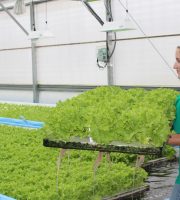The Need for Aquaponics in 2023!

And, how you can get started in Commercial Aquaponic Farming!
 Are you looking for an innovative, sustainable and profitable business model for a full time or part time business? Aquaponic food production might be exactly what you have been seeking. It is an excellent fit for many reasons.
Are you looking for an innovative, sustainable and profitable business model for a full time or part time business? Aquaponic food production might be exactly what you have been seeking. It is an excellent fit for many reasons.
The need for aquaponics continues to increase, with the high cost of food and the unstable supply chain. Here we are, in early 2023. Inflation has driven food costs to the highest we’ve ever seen. So, maximizing production while reducing inputs is the key to success in the food industry, or any industry for that matter. And, aquaponics allows you to grow food for local markets, reducing the cost, damage and complexity of long distance transportation of fresh food.
Aquaponic farming can produce large quantities of fresh fish and vegetables. When combined with controlled environment agriculture, also called indoor farming, aquaponics can be done year-round in any climate.
Setting up a commercial aquaponic farm and making it your full-time career is very achievable with a science-based system, proper training and support. Or, establishing a smaller MicroFarm aquaponic system and growing part time, selling retail is another great approach to getting started.
Aquaponic farmers compete against field grown and hydroponic produce. Aquaponic vegetables are superior in quality to both of these methods. Now, with the high cost of vegetables in grocery stores, the playing field is leveled and aquaponic produce stands out as the best choice based on both quality and price.
Once of the greatest benefits of aquaponics is the increased production of fresh fish and vegetables. Using Nelson and Pade, Inc.’s commercial aquaponic systems you will use approximately 1/6th of the water to grow 8 times more food per acre compared to traditional agriculture! That is an enormous improvement over traditional farming methods. Plus, you have control of all inputs and can boast safe food production by preventing contamination though good agriculture practices and utilizing standard operating procedures.
One of the highest costs in farming are fertilizers. In aquaponics, you don’t use them! In an aquaponic system, the primary input is fish food. You feed the fish a high-quality diet so that they grow and stay healthy. The fish waste breaks down in a series of biological filter processes. The result is a steady stream of nutrients that plants need for growth. Therefor, the need for manufactured or mined fertilizers is eliminated.
Another great benefit of aquaponics is that you don’t need herbicides because there are no weeds. This saves a great deal of labor and resources as well. The need for pesticides is eliminated by using natural means of pest control.
This means that you grow food in aquaponics without the use of chemical fertilizers, pesticides or fertilizers. All of these factors come together to make aquaponics one of the most sustainable, efficient and productive methods of food production. The integrated systems produce both a fish and a vegetable crop.
Aquaponics can be used to grow food in a commercial farming venture, for home consumption, for food banks and other social programs or as a tool in education.
So, how do you get started?
Starting an aquaponic business is a new career for most who enter. In fact, most of the clients who purchase commercial aquaponic systems from Nelson and Pade, Inc.® are professionals who have never been involved in farming. Aquaponics appeals to them because of the sustainability, efficiency and profit potential.
How does someone with no experience in farming or aquaponics launch an aquaponics business? With the right system, education and support. The first step is to enroll in the Aquaponics Master Class®. This course is now available online and can be taken by anyone, anywhere, on your own time and schedule.
Following or during the Aquaponics Master Class®, the prospective grower should develop a business plan that represents their investment, operating costs, marketing plan and profitability. With the Aquaponics Master Class® complete and a business plan in hand, a new grower is ready to take the next steps to establish the business. These steps might include:
- Secure land (purchase or lease) in a desirable location
- Add any needed infrastructure
- Purchase a greenhouse and have it built
- Place the order for a Commercial Aquaponic System or a MicroFarm from Nelson and Pade, Inc.®
- Further develop the marketing plan, name, brand and logo
- Assemble the aquaponic system(s) and begin growing, following the detailed Assembly and Operations Manuals
- Utilize the Nelson and Pade SOPs (Standard Operating Procedures) to start up and operate the system
- Engage with the Nelson and Pade, Inc.® Tech Support Team when you have questions
Nelson and Pade, Inc.® has provided aquaponic systems to clients in nearly 40 countries. Uses range from commercial farming to home food production, from providing fresh food to food banks and school cafeterias to establishing classroom-based, living aquaponics laboratories.
If you’d like to learn more about how other people are using aquaponic systems from Nelson and Pade, Inc. to grow fresh food, please see the Case Studies at www.aquaponics.com.
You can learn more about aquaponics here.
The Team at Nelson and Pade, Inc. is dedicated to helping people around the world get started in aquaponics. Feel free to reach out to talk about your future in aquaponic food production.
Email: info@aquaponics.com
Phone: 608-297-8708

Great read! As you mentioned, there are many benefits that comes with aquaponics. With it, we know exactly what we’re eating, where the food comes from and more. This will naturally cut down on illness and more. We need to take our food growing responsibility back.